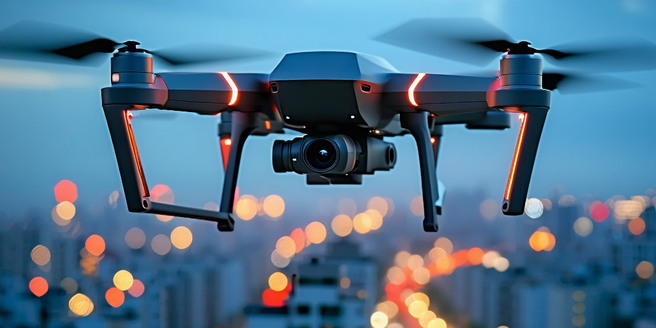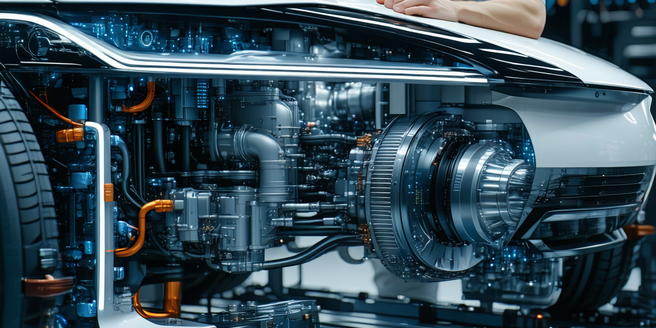
Ai In Autonomous Drones
AI integration in drone technology marks a significant advancement in robotics, transforming drones from simple remote devices to autonomous machines. Enhanced by AI algorithms, drones can now process data in real-time, improve decision-making, and learn adaptively. Features such as object recognition, obstacle detection, and optimized flight paths exemplify these advancements, expanding drone applications in logistics, agriculture, and surveillance. AI refines drone navigation, offering precise control even in GPS-denied areas through sensor fusion and machine learning. Safety is enhanced with real-time collision avoidance and predictive maintenance, ensuring reliable and secure operations. AI-powered drones are revolutionizing industries, optimizing tasks in agriculture, construction, public safety, and logistics. Future prospects for AI in drones are bright, with emerging technologies promising even greater autonomy and innovative applications.

Marketing Automation Platforms
Marketing automation leverages software to enhance marketing processes like customer segmentation, data integration, and campaign management, boosting efficiency and personalization. Top marketing automation platforms feature robust analytics, CRM integration, and A/B testing tools, enabling targeted messaging and comprehensive marketing ecosystems. Benefits include improved efficiency, customer engagement, and scalability, leading to higher conversion rates and better resource allocation. Popular platforms like HubSpot and Mailchimp offer user-friendly interfaces, while Marketo and ActiveCampaign provide advanced customization. Successful implementation involves strategic planning, data organization, and continuous optimization. Future trends point to increased personalization through AI, predictive analytics, and a focus on data privacy.

Online Platforms For Nutrition Advice
The growing necessity of online nutrition guidance is evident in today's fast-paced world, where maintaining a balanced diet is increasingly challenging. As obesity rates rise, proper nutrition is critical, and digital platforms provide a convenient, personalized solution. These platforms offer tailored advice for weight management, athletic performance, and dietary restrictions, making nutrition accessible for those unable to attend in-person consultations. Evaluating the credibility of such platforms is crucial; users should seek ones run by certified professionals and backed by scientific research. Many online platforms like MyFitnessPal, Cronometer, and Noom have become leaders in offering diverse resources such as dietary plans, tracking tools, and expert consultations. Choosing the right platform requires considering personal health goals, support level, and cost. The benefits of online resources include accessibility, personalized guidance, and an extensive array of educational materials, effectively supporting modern dietary management.

Energy Efficiency Through Smart Plugs
Smart plugs are innovative devices that connect to home appliances, enabling control via smartphone apps or voice commands. By managing power supply, they enhance convenience and energy efficiency. These devices provide real-time energy usage data, helping reduce consumption and improve safety by allowing remote control of forgotten appliances. Smart plugs contribute to sustainability by optimizing electricity usage and lowering electricity bills. Choosing the right smart plug involves considering functionality, compatibility, and budget. Integration with home automation systems streamlines control and further boosts efficiency. Case studies show significant energy savings in both residential and business settings, demonstrating smart plugs' role in cost reduction and environmental conservation. Future trends include AI integration, promising advancements in smart plug technology.

Ergonomic Office Chairs
Ergonomics plays a crucial role in office furniture by enhancing comfort, productivity, and health for individuals spending significant time seated at desks. Ergonomic chairs support proper posture, reduce bodily strain, and promote spine alignment, which prevents back pain, shoulder tension, and carpal tunnel syndrome. Key features such as adjustable height, lumbar support, and armrests cater to individual needs, ensuring fluid movement and reducing discomfort. Ergonomic chairs are beneficial for health by evenly distributing body weight, reducing fatigue, and promoting better circulation. Models like the Herman Miller Aeron, Steelcase Leap, and Secretlab Titan exemplify top ergonomic designs, enhancing workplace wellness. Selecting the right chair involves considering adjustability, support, budget, and design to improve comfort and boost productivity.

Technological Minimalism
Technological minimalism is a lifestyle focused on simplifying the digital space to enhance mental clarity and productivity. It promotes a mindful relationship with technology by prioritizing essential tools that align with personal goals and values, leading to a streamlined, centered life. Embracing less tech reduces distractions and stress, fosters deeper engagement, and increases efficiency by valuing quality over quantity. Identifying essential technologies requires evaluating daily tools and their impact on life. Steps to simplify your digital life include decluttering devices, managing notifications, setting boundaries, and practicing mindful tech use. Overcoming challenges in a tech-heavy world involves clear boundaries and strategies to minimize distractions. As technology evolves, technological minimalism may become more prevalent, encouraging balanced, purposeful use and inspiring innovations that prioritize user empowerment and simplicity.

Electric Vehicles Revolution
The historical development of electric vehicles (EVs) saw a resurgence in the late 20th century, driven by advancements in battery technology and environmental concerns. Innovations, such as lithium-ion batteries, enhanced EV range and performance, leading to a market expansion supported by major automakers and startups. EVs offer environmental benefits by reducing tailpipe emissions and, as renewable energy sources grow, charging them becomes more eco-friendly. However, scaling EV infrastructure poses challenges, including expanding charging networks and upgrading power grids. Innovations such as solid-state batteries, wireless charging, and AI are shaping electric mobility's future. Government policies, including financial incentives and emissions regulations, are key in accelerating EV adoption, making them more affordable and promoting infrastructure growth.

Best Platforms For Virtual Team Building
Virtual team building platforms are transforming remote collaboration by offering tools that enhance communication and teamwork among geographically dispersed teams. These platforms integrate features like video conferencing, shared workspaces, and interactive games tailored to boost team rapport and spirit. As remote work grows, the importance of investing in these tools becomes evident for maintaining productivity and fostering a collaborative culture. Essential features to consider in such platforms include user-friendliness, scalability, diverse activity options, multiple communication modes, analytics, and security. Small teams benefit from platforms like Donut and Icebreaker that focus on personalized interactions, while large organizations may prefer comprehensive solutions like Zoom and Microsoft Teams. Evaluating a platform's effectiveness involves tracking user engagement, feedback, and communication improvements to ensure positive outcomes and an effective return on investment.

Neuralink And Brain-computer Interface
Promising advancements in brain-computer interfaces (BCIs) facilitate communication through neural activity, impacting industries like healthcare and gaming by enabling control of external devices via brain signals. BCIs offer transformative potential, aiding stroke patients and providing communication channels for those with disabilities. Neuralink, spearheaded by Elon Musk, aims to merge human brains with AI, enhancing cognition and treating neurological disorders with high-speed neural implants. The technology's applications span healthcare, memory enhancement, and military use, but ethical concerns over privacy and societal disparities arise. Addressing security and access is crucial as BCIs approach mainstream integration. The ongoing evolution of BCIs suggests a future rich with possibilities yet fraught with challenges regarding signal clarity, implant safety, and interdisciplinary collaboration.

E-learning Tools
E-learning platforms are revolutionizing the educational landscape by offering flexible and scalable solutions that cater to diverse learning needs. They enhance the learning experience through customizable content, multimedia elements, and interactive assessments, making them essential tools for both corporate training and academic courses. Acknowledging different learning styles, e-learning tools like Prezi, Canva, and Audible provide tailored experiences that boost engagement and retention. By integrating these tools with traditional education, educators create a hybrid model that enriches classroom instruction and prepares students for a digital future. As e-learning continues to evolve, trends like Artificial Intelligence and immersive technologies promise to further personalize and enhance the educational experience.

Quick-connect Earbuds For Instant Use
Quick-connect technology has transformed the use of wireless devices, offering near-instantaneous connections and enhancing user convenience. By reducing pairing time, it enables seamless transitions between tasks, such as listening to music or participating in calls. Quick-connect earbuds utilize Bluetooth and sometimes NFC technology for efficient pairing and switching between multiple devices. Popular models like Apple AirPods, Samsung Galaxy Buds, Jabra Elite 75t, and Sony WF-1000XM4 exemplify the benefits of quick-connect features, enhancing user convenience and audio experiences. When choosing earbuds, consider compatibility, battery life, sound quality, comfort, and additional features. To maximize battery life and connectivity, maintain and update devices regularly and adopt power-saving habits. These practices ensure optimal performance and longevity, making quick-connect gadgets essential for tech-savvy consumers.

Smart Hearing Aids And Sound Technology
Smart hearing aids are revolutionizing auditory technology by merging traditional amplification with modern digital features. These devices offer automatic sound adjustments, background noise filtration, and smartphone connectivity for enhanced control and customization. By integrating advanced algorithms and sensors, smart hearing aids cater to individual needs, improving communication and quality of life. They feature digital signal processing for clear audio, directional microphones for focused listening, and frequency manipulation for comfortable hearing. Key attributes include Bluetooth connectivity, noise reduction, rechargeable batteries, and adaptive sound processing. Unlike traditional aids, smart hearing aids provide superior sound and user experience with automatic adjustments and app control. AI plays a crucial role in sound processing, adapting to environments and user preferences. Future trends in hearing aid technology include more AI integration, seamless connectivity with smart devices, miniaturization, enhanced battery life, and possibly health monitoring features.